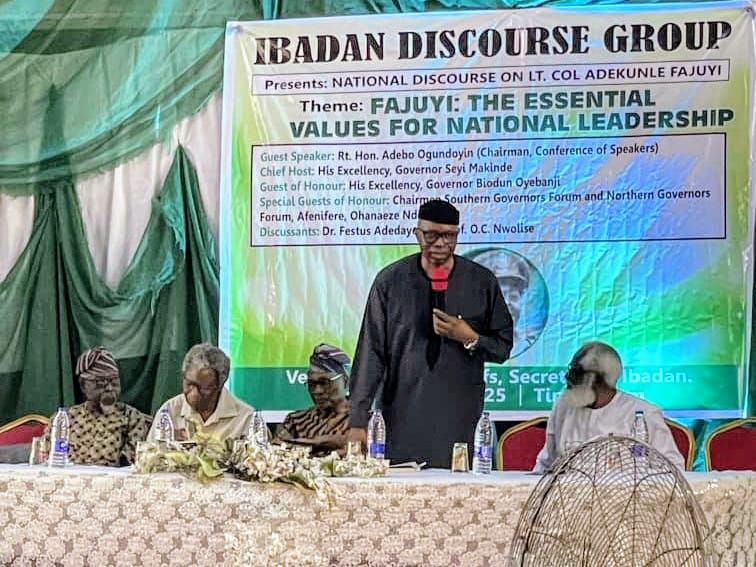The legacy of the late Lt. Col. Adekunle Fajuyi was brought to national consciousness once again as intellectuals, political leaders, students, and civil society groups gathered at a national discourse themed “Fajuyi: Essential Values for National Leadership”, held at the House of Chiefs, Secretariat, Ibadan.
The event was organised by the Ibadan Discourse Group (IDG) to honour the late military officer’s selfless sacrifice and inspire a new era of value-based leadership in Nigeria.
Chairman of the event, Chief Adebisi Adesola, in his address, described the discourse as timely, especially in the face of Nigeria’s leadership crisis and recurring governance failures.
He lamented the persistent pattern of underperformance in national leadership and the unending cycle of blame.
“Over the years, we have identified leadership as a major problem that has handicapped the full realisation of our country’s potentials,” Adesola said. “This running battle continues.
“From Obasanjo to his successors, the blame game hasn’t ceased. We chose to spotlight Fajuyi because his leadership was sacrificial and unifying—values sorely needed in today’s Nigeria.”
Adesola highlighted the mission of the Ibadan Discourse Group as a non-partisan think tank focused on intellectual engagement, offering practical solutions to societal issues through partnerships with likeminded individuals and institutions.
In his keynote address, Ambassador Yemi Farounbi, Patron of the IDG, extolled Fajuyi’s unmatched loyalty and courage. He recalled Fajuyi’s heroic display of bravery during the Congo mission in the era of the Lumumba crisis, which earned him the Military Cross, Britain’s highest military honour for gallantry.
Farounbi also praised Fajuyi’s ultimate sacrifice in July 1966, when he chose to die alongside Nigeria’s Head of State, General Johnson Aguiyi-Ironsi, rather than abandon him to a coup plot.
Aside from his military feats, Fajuyi was lauded for his administrative acumen, notably his efforts in diffusing the volatile Operation Wetie political unrest that engulfed Western Nigeria between supporters of Chief Obafemi Awolowo and Chief Ladoke Akintola.
Former Ondo State Governor, Dr. Olusegun Mimiko, addressing the press at the event, emphasised the need to teach Nigeria’s younger generation about heroes like Fajuyi.
“Fajuyi’s discipline, courage, and selflessness are the building blocks of any progressive nation. The intervention and presence of students at this event gives us hope. We must continue to celebrate our national icons to help shape our future,” Mimiko said.
Mimiko advocated for national cohesion, constitutional restructuring, and an end to electoral malpractice, which he described as “civilian coups.” He further urged the IDG to explore creative storytelling through historical films to amplify Fajuyi’s legacy.
The event’s guest lecturer, Professor O.B.C. Nwolise, spoke passionately about the root of Nigeria’s challenges, stating that lawlessness, not leadership, is Nigeria’s greatest problem.
“When laws are broken with impunity, bad leadership becomes inevitable,” he said.
He criticized Nigeria’s failure to build a truly united nation, describing the country as a “state” rather than a cohesive nation. He proposed actionable recommendations, including: immediate reconvening of the Southern Governors’ Forum and their spouses’ forum; reconciliation efforts to ease tensions between Yoruba and Igbo communities; creation of a philosophical and musical education team drawing from Eastern and Western traditions to promote values like sacrifice; and establishment of a tripartite Adekunle Fajuyi/Aguiyi Ironsi Memorial Hospital, combining foreign medicine, African traditional healing, and spiritual care.
Other speakers in their separate submissions emphasized the need to embrace unity, peace, and national development, encouraging Nigerians to draw inspiration from the discipline, hospitality, and bravery of Lt. Col. Fajuyi.
Present at the event were representatives of Ohanaeze Ndigbo, Chief Adebisi Adesola, Alagba Banji Ogundele, Prof. Nwolise, student representatives from University of Ibadan, Ibadan City Polytechnic, Omololu Olunloyo Polytechnic, pressure groups, media representatives, and members of the Fajuyi family.
The national discourse ended with a renewed call for Nigeria to look to its past heroes, not just for memory’s sake, but as models for cultivating a responsible, inclusive, and courageous leadership future.

